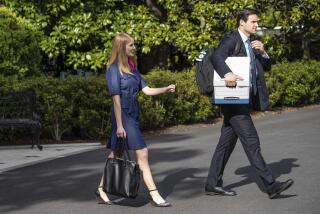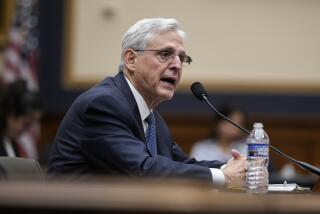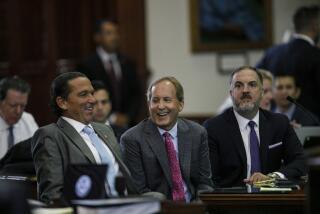Terrorism is the crucible for Ashcroft’s career
The past year has not been an easy one for John Ashcroft. He lost his Senate seat to a dead man. He wasn’t President Bush’s first choice for attorney general, and he came to the job only after a withering confirmation process.
Even now, as he emerges as one of the most prominent figures in the administration’s counterterrorism effort -- and as perhaps the most activist attorney general in decades -- Ashcroft still finds himself on the defensive.
Critics across the political divide are questioning his policies, which allow investigators to eavesdrop on attorney-client conversations, detain more than 1,200 people while providing few public details, and call for questioning 5,000 foreign young men, none of them suspects.
His former Senate colleagues want Ashcroft to appear before the Judiciary Committee to answer questions about the investigation tactics.
One liberal activist calls the attorney general “the most dangerous threat to civil liberties in the federal government.”
Ashcroft is unapologetic about his aggressive response to the Sept. 11 attacks. In the hours after the lethal hijackings, Ashcroft has recounted, Bush took him aside, looked him in the eye and said, “John, I want you to prevent that.”
“We simply are not going to tolerate terrorists coming to this country to kill thousands of innocent Americans,” Ashcroft said in a recent television interview. “We’re going to use every tool in the American judicial system and justice system to protect innocent lives.”
The Justice Department’s sweeping response, though, has alarmed some in Congress, as well as legal scholars and civil liberties groups. Judiciary Committee Chairman Patrick J. Leahy of Vermont and the committee’s ranking Republican, Sen. Orrin Hatch of Utah, sent a terse letter to Ashcroft, asking him to appear at a hearing scheduled for Wednesday.
Rep. Bob Barr, a conservative Georgia Republican, has called for similar House hearings and said last week that the federal government is moving to “suspend a whole range of civil liberties for crimes committed in this country, and that is something we should not do lightly.”
Other critics have aimed more directly at Ashcroft, 59, a deeply religious and strictly conservative former Missouri senator and governor whose nomination for attorney general was sharply opposed by Democratic senators and liberal interest groups.
“Terrorism isn’t the only threat to our way of life,” said Ralph G. Neas, who as president of the liberal advocacy group People for the American Way singled out Ashcroft as the government’s worst threat to civil liberties.
“We need an attorney general who will stand up to terrorists, but we also need an attorney general who will stand up for the Constitution and the Bill of Rights,” Neas said.
Ashcroft defends his actions in the fight against terrorism, saying that none bypasses constitutional protections and all are urgently needed to capture a dangerous, unpredictable foreign enemy.
Over the past year, Ashcroft has proved his ability to absorb even the toughest hits.
Last November, his political career appeared finished when he lost his Senate seat after one term to Democratic Gov. Mel Carnahan, who had died in a plane crash shortly before the election, too late for ballots to be reprinted. The state’s new governor appointed Carnahan’s widow, Jean, to the seat.
Ashcroft bowed out gracefully and did not challenge the result in court, but some of his supporters argued that Jean Carnahan did not meet a constitutional requirement that a senator must be a citizen of his or her state on Election Day.
The former Yale football player and University of Chicago law graduate wasn’t an automatic pick for the Bush Cabinet. He was tapped for attorney general only after some conservatives objected to the front-runner, Montana Gov. Marc Racicot.
Ashcroft’s nomination met stiff resistance from liberal advocacy groups and Democrats. Former senators traditionally are afforded deference in confirmation hearings, but Ashcroft took a bruising. The Judiciary Committee affirmed his nomination by a vote of 10-8, virtually along party lines. In the full Senate, 42 Democrats voted against him.
In his first year on the job, the new attorney general has set a distinctly more activist -- and more conservative -- course for the Justice Department. An order issued earlier this month attempted to block Oregon’s physician-assisted suicide law by prohibiting doctors from prescribing lethal doses of federally controlled drugs to terminally ill patients. (A federal judge has issued a temporary restraining order halting enforcement of that ruling.)
Under Ashcroft, the federal government also has begun efforts to end the use of marijuana for medical purposes in California and to settle the Clinton administration’s lawsuit against the tobacco companies over the public health costs of smoking.
Ashcroft’s father and grandfather were evangelical preachers with the Assemblies of God church, and he holds morning prayer sessions that Justice staffers are invited, but not required, to attend.
For the most part, Ashcroft is single-mindedly focused on combating terror. For weeks after Sept. 11, he personally briefed the president on the status of the investigations. He has spent hours working in the FBI’s crisis operations center, playing a hands-on role in the investigation.
Terry Eastland, a Justice Department official in the Reagan administration, said Ashcroft seemed to grow into his role in the weeks after the attacks, putting behind him the confirmation controversies that had threatened to overshadow his term.
Republican Sen. Christopher Bond of Missouri has said that, almost a year after the divisive confirmation proceedings, Ashcroft’s efforts to fight terrorism are winning over some of his earlier critics.
“It is clear that one year later, he has risen above those harsh partisan attacks by helping to unite our entire nation as it searches for justice,” Bond said.
In his response to the events of Sept. 11, Ashcroft has ordered a five-year “wartime reorganization” that would make counterterrorism the overriding priority of federal prosecutors and agents.
He has proposed fundamentally to reshape the troubled FBI and the Immigration and Naturalization Service and has delegated broader powers to Justice Department investigators.
Ashcroft also played a key role in Bush’s recent decision to allow secret military tribunals to try foreign terrorism suspects, which has drawn some of the sharpest criticism.
Philip B. Heymann, a deputy attorney general in the Clinton administration, said effective counterterrorism efforts have been ignored.
“There’s no sign they are building a strong, preventive capability in intelligence -- not in terms of intelligence gathering, but in terms of intelligence processing,” said Heymann, a Harvard law professor.
But Ashcroft has the clear support of the White House and, perhaps, the legal authority of history. In a 1998 book, U.S. Supreme Court Chief Justice William H. Rehnquist -- who could preside over any Supreme Court challenge to the administration’s moves -- called it a simple truism that, “In time of war, the government’s authority to restrict civil liberty is greater than in peacetime.”
Ashcroft has said that the Bush administration’s recent steps are in response to the “acts of war” of Sept. 11. More often, though, he has compared the counterterrorism fight to Robert F. Kennedy’s campaign against organized crime when he was attorney general during the 1960s.
“We must rededicate ourselves to the preservation of our way of life,” Ashcroft said at a recent ceremony when the Justice Department’s headquarters was named in Kennedy’s honor. “We must rededicate ourselves to the safety and security of innocent people from the sources of evil in the world.”
More to Read
Start your day right
Sign up for Essential California for news, features and recommendations from the L.A. Times and beyond in your inbox six days a week.
You may occasionally receive promotional content from the Los Angeles Times.






